#can you tell I love subversion of that story????
Explore tagged Tumblr posts
Text
love this movie, I mantain the idea was perfect, ecco una dimostrazione del mio amore:

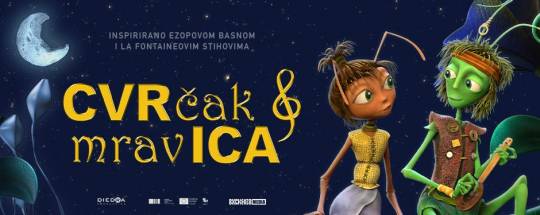

#Cvrčak i mravica#parallels#web weaving#per il lol#e perchè avevo tutto a portata di click#my soft spot for subverting aesop ' cicada and the ant' fable#can you tell I love subversion of that story????#can you tell this movie gets it???#but literally why are english translations grasshopper or cricket??? XD#i can at least get that cricket sing#but grasshopper do not even sing lol#if they used a cicada design it would have been cool#but alas#twink cavallette è quello che piace fare ai 3d modeler#da ouat a questo.... solo strane cavallette twink verdissime#cavallette twink verdissime e formiche marroni gli unici 2 gender#moss text#mossmx edit#ora come entro in contatto con un* croat* per farmi spiegare le sottigliezze delle references comuniste nel film???
3 notes
·
View notes
Text
man. the most persistently irritating thing about daniel emond's "kill the whale" is how fucking GOOD it is at times.
every day I think about The Quarterdeck and how phenomenally it portrays that scene and the magnetism of agreeing to Ahab's quest even despite fear, and Dusk and the subplot of Starbuck falling in love with Ahab and being terrified of what that means, but ESPECIALLY Fedallah's introduction song where Fedallah is presented as a woman with agency, who looks the audience in the face and dares us to judge her for the life she has chosen.
Fedallah is presented as the captain's lover, the captain's party trick and pleasure, and owns the shitshow she lives in, and only chooses to reject that life once she tires of Ahab's fetishization and exotification of her, and then uses the very thing Ahab fetishizes so much (her prophecies) as a way to spell her own doom and drag Ahab down with her, freeing herself. The shivers I still feel when I hear Fedallah's triumphant crow of "come back here" as she sinks below the waves and Ahab watches in horror, knowing she is next.
that fucking ruled to a degree that shook me!!!!!!!!! and hearing Grace McLean and Amber Gray (and Danielle McKnight) duke it the fuck out through song was just genuinely magnificent!!!!!!!!!!!!!!!!!!!
and then the narrative kicks you right in the throat by calling queequeg "q" for two hours straight and making his marriage to ishmael lowkey racist hate sex
#moby dick#kill the whale#daniel emond#daniel if u see this i do genuinely think you have such a fantastic musical brewing here i am being so serious#u 100% have my ticket if this ever goes live#but i am also on my hands and knees begging you to talk to a pasifika person about this for like one hour minimum Please#norman sann is incredible and deserves to be a huge part of this show do not get me wrong#but you need to figure out what you're doing with q because bro. if you join the long line of ppl denying pasifika rep in moby dick#notably the book with a protag love interest Who Is Pasifika#you will be FUMBLING an otherwise Incredible bag. holy shit.#(also as a personal note please make fedallah textually zoroastrian please gbdjfhdjfndj)#ok thats all#<- tags that might sound insane but this guy regularly looks himself up on line and has found ME specifically THRICE across dif. medias#so the chance of him seeing this is nonzero so. just covering my bases#anyways#mossy speaks#god fedallah in this show makes me INSANE 'you will not summon me and you can tell yourself your own bedtime stories' had me SCREAMING#it takes a LOT to get me to root against ahab#ESPECIALLY hot lady ahab?????? with the fuckinfkfnf. grace mcleans presence and her lowkey strip tease???? like dude i was so cooked#i got distracted. talking abt fedallah. anyways. dude the way she rallies against ahab is genuinely so subversive and brilliant#like THAT is good shit. why was the whole musical not this good. auaugrhrhhrhrhdhhhgjgjkgn#mobydick adaptations r so consistently bad to mid but with specific things that change your entire life sprinkled in and leave me like 🧍🧍#(not counting hayashida's album. that is genuinely flawless. no notes. 100% stand by it)#but this adaptation comes the closest to touching greatness. i just 😭i need it to be Better in the parts where its lacking. bc it has-#SO MUCH POTENTIAL. and the CAST????? AUGHGHHHHHBFJ. god. every one of them is divine#anyways yap session over im normal. ivr been thinking abt this for days but im normal now
9 notes
·
View notes
Text
it would have been good if Cindrella was more outspoken. And call out her family on not feeling **regretful and apologizing** after insults, ridicule and abuse.
#whose sense of fulfillment extends past her appearance#Disney princess 👸#They could have added hatemob in a form of their like-minded people like a choir#Straying away eye contact and narrowing eyes as if that person is hard to see(like they have a bad vision) and no one really telling to def#defend yourself even Fairy Godmother (who could be a project of Cindy's imagination who's also like thinks violence and insubordination#isn't an answer nor feminine)#You could add more realism to Cindrella like if you can't really stand up from home abuse what about abuse outside#Add hate mob that are the choir that would be perfectly even more realistic#And perhaps for a reinvention let her dad or fairy tell that you need to tell your abusers off tell them that choring is their job#And for the external abuse huz's mom tell you have to tell them off you have to attack(or smth of that) because by that you not only show#you can also answer-attack but you can do it twice 💪#Answer the bullies so they know you can do that not only that but doing it TWICE#And like imagine choring during your menstruation like wtf#Fuck them off you need to take care of yourself first#Cindrella a true story Cindrella grows awareness and a backbone#Cindrella and a choir hatemob#them be like “oh you need to look after my stuff and bag; oh sorry my bad that was actually my friend seat right here”#And tell her “if you don't behave nobody would love you” turn over to#“If they like me they just like me” “I don't need to turn into a downtrodden people-pleaser to be liked. That's fake” and#“good girls”go to hell#female socialization subversion#Strong Ella's#Tmnt#And not make abuse because of jealousy or smth because they've seen the behavior of#bringing violence into home and then not regretting and not apologizing#.Like the original poster have said “whose sense of fulfillment extends past her appearance or wedding plans”#That stepmother really tought that adopted daughter was a better option because other bio girls won't subordinate but really what's going o#is adopted one has turned into a standard house worker; specifically#a worker if not serving then beaten or insulted without regret or apology#And cindrella can be also called bruisisella
3 notes
·
View notes
Text
no by all means keep judging cartoon villains solely by if they get redeemed in the end. i know some of us like to talk about other stuff like characterization or entertainment value or nuance as something that makes a good villain. but i think the only thing that actually matters is if the villain ends up on good terms with the protagonist at the end. all the Good TM cartoons with Good TM creators make the villains die a Horrible Death for being Abusers or whatever. and all the Bad TM cartoons with Bad TM creators Forgive Fascists by not making them get publicly executed by the 14 year old protagonist in front of the 8 year old target demographic.
i mean im so glad that more cartoons nowadays are subverting the psyop to support fascists that a few queer artists and queer shows definitely invented in 2017. there are so many popular cartoons doing that. it's almost like there are more properties killing their villains now and in the past than there ever were of properties that didn't do this. and it's almost like whether the villain gets redeemed at the end is more about the context of the story and its themes leading up to a narratively sound decision.
but you know. a few queer shows made by trans ppl were popular and they didn't kill their fascists and even had the gall to make them nuanced while also looking into the harm they did. guess it's trendy to forgive your abusers now because like two cartoons said so. out of like 40 other similarly high profile works that just straight up hit their villains with a bus or smth. by all means. keep heaping praise onto that one show about how they "let their villain just be evil" instead of talking about anything more interesting. that's so subversive, everyone's doing it!
#shut up pandora#check off my 'monthly rant about the treatment of the creators of steven universe and she ra'#this is because of the 'praise' ive been seeing for belos btw#yes i love his panache i love how much he fucks up everything and i love how hes beyond redemption#thats not because he was Born Evil and has always Been Evil???#ppl who show baby belos going out of his way to make calebs life a living hell and evelyn Rescuing this poor blond boy from his Evil Brothe#i am sending so many bad vibes at you rn#he isnt a good villain bc dana terrace decided to be 'subversive' by not redeeming belos#JUST being subversive while writing the story doesnt mean you make a good story being subversive =/= being good#hes a good villain because while his decisions are dogshit we can understand why he made them on an emotional level#and since gravity falls seems to be the golden standard for modern cartoons i guess#bill cipher also isnt a good villain bc hes evil and they killed him#bill is a good villain bc hes entertaining in the threat he poses#what makes a character a good villain is about stuff they do while theyre being a villain#dont just sum it up with 'duhhh they killed them at the end so its good' thats entirely dependent on the story!#anyway this is specifically about modern western cartoon fandoms#if youre telling me to watch shows that arent modern western cartoons or like. read a book then know that i do that already#this stuff isnt as big of a discourse topic in those circles but im talking about this specific circle rn
30 notes
·
View notes
Text
Inspirations and Themes in “Nosferatu” (2024), according to Robert Eggers
At the surface this film appears to be “just another remake”, but it’s actually the opposite; it’s a subversion of every theme in Bram Stoker’s “Dracula” and on the original 1922 “Nosferatu”; because Eggers threw the “sexual purity”, “Christian salvation” and “Victorian romantic love” out of the window in this one.
What is Robert Eggers’ “Nosferatu” about? What are the themes? What makes his adaptation different from the others? Let’s explore the list of inspirations for this story, according to their own creator:
1. Emily Brontë “Wuthering Heights” (1847)


“You loved me then, what right had you to leave me? What right, answer me, for the poor fancy you felt for Linton? Because misery and degradation, and death, and nothing that God or Satan could inflict would have parted us, you, of your own will, did it. I have not broken your heart, you have broken it; and in breaking it, you have broken mine.”
Themes of the all-consuming, obsessive and self-destructive passion, wrecking the lives of everyone around them and only stops when they are both dead; the destructive power of love; revenge; love triangle between a “beastly” man/mental unstable woman/gentleman; blend of hatred and love; couldn’t be together in life, united in death and reunited in the spiritual world; I already expanded on this topic in another post.
2. “Svengali” (1931)

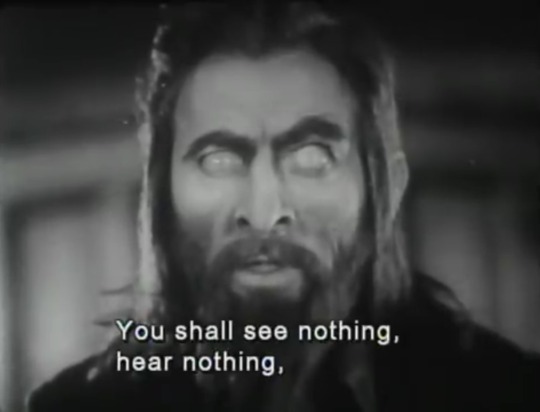
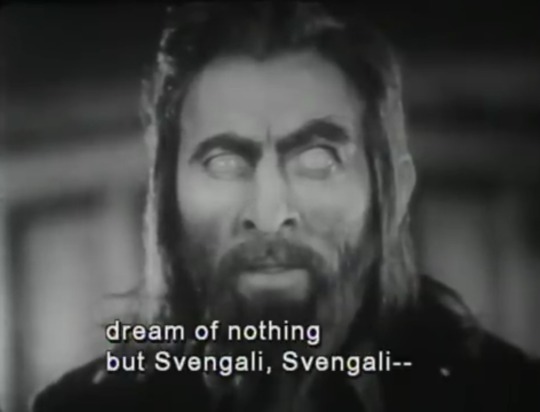
“Oh, God, grant me in death what you denied me in life; the woman I love.”
Theme of the villain who induces others in a hypnotic and mesmerized states; infectious nature which causes contradictory feelings of repulse vs. attraction. Orlok using his sorcery to access Ellen (once again); Love triangle between a obsessive hypnotist/young woman/gentleman; Ellen’s life consumed by her connection with Orlok; couldn’t be together in life, united in death and reunited in the spiritual world.
3. “La Belle et la Bête” (Beauty and the Beast) (1946)


“Love can turn a man into a beast. But love can also make an ugly man handsome.”
Themes of reality vs. appearance: nothing is as it seems, and there’s more to the story than meets the eye. The storytelling is intricate, complex and requires intention and receptivity to truly understand it. Transformation and metamorphosis. Love and self-acceptance; embrace oneself and breaking free from social expectations. Cursed creature whose curse can only be broken by love: “And so the maiden fair did offer up her love unto the beast, and with him lay in close embrace until first cockcrow, her willing sacrifice thus broke the curse and freed them from the plague of Nosferatu.”
4. “Great Expectations” (1946)
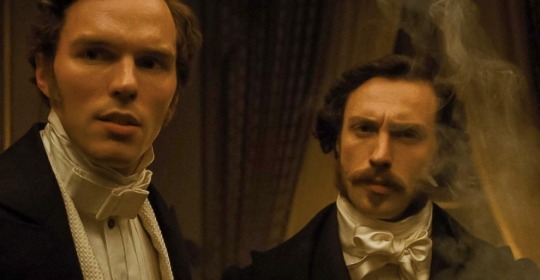
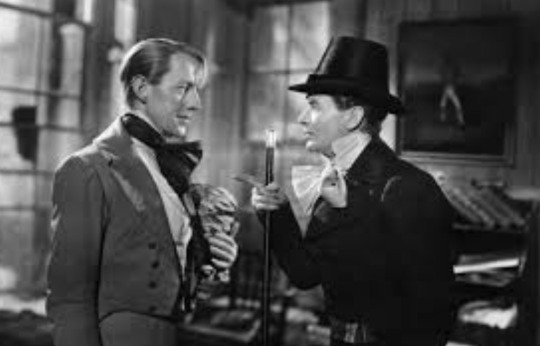
“A young gentleman of great expectations.”
Themes of wealth and ambition vs. affection and compassion. Inspiration for Thomas Hutter character, who seeks social advancement, wealth and climb the social ladder, motivated by a desire of self-improvement. Friedrich Harding is Thomas’s Pip Estella; as he wishes to emulate him, and become a sophisticated gentleman. The arrogance and snobbishness of the upper class. Taking damaging risks in order to achieve ambition (traveling to a remote and mysterious castle), and falling into debt to sustain a certain lifestyle (with Friedrich). Learning that love is more important than wealth, the hard way (both Friedrich and Thomas).
5. “The Queen of Spades” (1949)

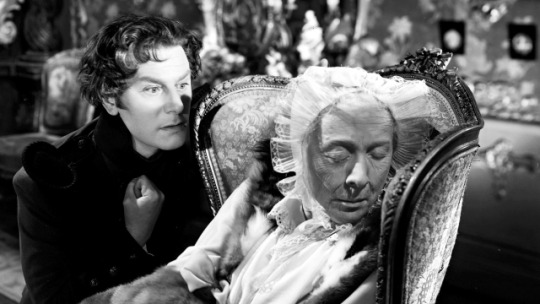
“If you've any human feeling in your breast, you can't refuse me. I beg. I beseech you. I know why you won't speak. The secret is connected with some terrible sin. That's it, isn't it? I'll make a bargain with you; tell me your secret and I'll take your sin upon my soul. Do you hear me? I mean it. A bargain. I'll take your sin upon my own soul.”
Theme of the horror element relying on Gothic ambience and atmosphere, than overt terror. Heavily rely on visual symbols to give meaning to the story: in “Nosferatu” are the lilacs and windows showcasing the connection between Ellen and Orlok. The idea that malevolent forces are at work is introduced early in the narrative. Theme of Faustian deals with the Devil. Themes of fate and the supernatural commanding the life of the characters, and leading to their demise. Themes of greed, power and pride leading to ruin; thirst for power as a pathway to madness, loss of dignity and loss of compassion for others, embodied in Herr Knock’s character, as he won’t stop at nothing to learn Orlok’s secret of immortality.
6. “The Innocents” (1961)


Miss Giddens: Were Quint and Miss Jessel in love? They were in love, weren't they? Mrs. Grose: Love? [Laugh] Oh, I suppose that's what she called it. But it was more like a sickness. A fever that leaves the body burned out and dry.
Themes of sexual repression and Victorian views of female sexuality (wickedness; sickness, shame; contagion; corruption) vs. love (pure; virginal; sacred; innocent; over-protective). The female protagonist overbearing protection of the children/Thomas masks her underlying conflict with her own sexuality (which she sees as sinful, shameful and diseased). Probably the inspiration for connecting flora (lilacs vs. willow tree) with the Ellen and Orlok, too.
7. “Andriesh” (1954)

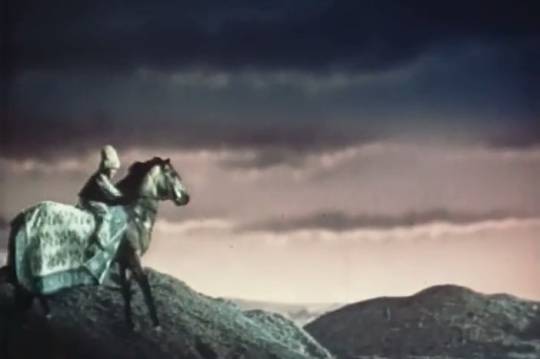
Theme of the folk horror fairy tale, which also characterizes “Nosferatu”. The inspiration for Thomas dwelling in Transylvania and traveling to Castle Orlok, in the Carpathian Mountains; as he’s also given a magical token for protection, meets the people targeted by the supernatural, and faces a perilous journey to reach the castle, and then escape the castle; making allies along the way (Romanian old lady and the Nuns).
8. “Vechir na Ivana Kupala” (“The Eve of Ivan Kupalo”) (1968)

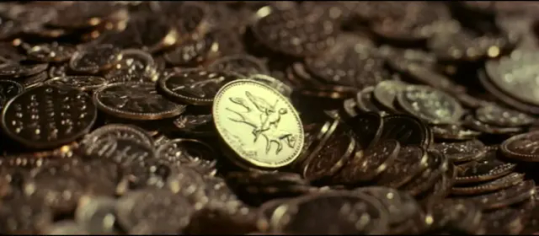
Theme of a darkly evocative, poetic and imagistic story deeply rooted in folklore. Use of several and overlapping cinematic techniques (fast motion, camera angles, etc.), to break the sense of reality within the film; in “Nosferatu” this probably translates in the dream/nightmarish atmosphere and hallucinations. Quick changes in tone (from horror to comedy to melodrama). Non-linear story and “show, not tell” approach; where the symbolism, mythology and cinematic complexity are more important than dialogue. Probably also the inspiration for Orlok giving Thomas’s a mount of gold as payment for his signature on the covenant, which will lead to the ruin of his marriage to Ellen.
9. “Leptirica” (“The She-Butterfly”) (1973)
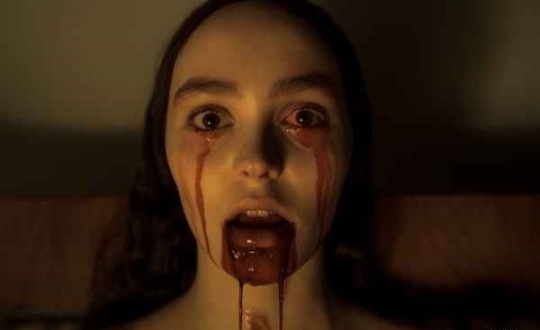

Theme of a story and a vampire heavily influenced by folklore; in “Nosferatu”, by Romanian (strigoi). Use of humor to disarm the viewer. Withholding the reveal of the vampire to the audience; starting with close-ups on the hands, eyes, etc. Using a horse to find the grave of a vampire (in Balkan folklore it’s a black stallion, but Eggers probably choose white to be more visible in the night). A new and completely original ending to a cult classic. The female lead character appears to be naïve and harmless, but is revealed to be the true monster of the film.
#Nosferatu 2024#Robert Eggers#Ellen Hutter 2024#Count Orlok 2024#Thomas Hutter 2024#Friedrich Harding#Herr Knock 2024#lily rose depp#bill skarsgård#nicholas hoult#aaron taylor johnson#wuthering heights#catherine x heathcliff#Svengali#Svengali 1931#la belle et la bête#beauty and the beast 1946#the innocents#the innocents 1961#great expectations#great expectations 1946#the queen of spades#andriesh 1954#the eve of ivan kupalo#vechir na Ivana kupala#leptirica#the she butterfly
241 notes
·
View notes
Text
Thinking about the way dungeon meshi does queer horror. Using horror to tell queer stories is already subversive, but dungeon meshi subverts it even more
Normal queer horror is like. A monsterous desire and immortal love of something isolated/hated and the uncontrollable but suppressed need to consume someone to live and they only die if you break/pierce their heart. its great.
In dungeon meshi, the group is STARVING. they do things the way they're expected to and they're so deprived that eventually, one of them is consumed by that monsterous desire.
Then when Falin becomes a monster, she doesn't eat Marcille because she doesn't NEED to, Marcille already offered herself up as part of Falin by mixing her own blood with the dragon's for the resurrection.

Also Marcille is a monster too!! She doesn't need to be turned by Falin. She's a 'witch' doing black magic for one but she's also very vampiric
Her name is super vampirey especially given one of the translation spellings was Marcilla, an annogram of Carmilla*. And Marcille is very similar to Marceline from Adventure Time so it's a name with heavy connotations to me. Also her staff is Ambrosia which means immortal.
*ps Carmilla is the original modern vampire that inspired Dracula and also a lesbian. she used annagrams of her name (Marcilla, Mircalla, Millarca) to disguise herself across hundreds of years.
Marcille is like. a vampire in that death is a big part of her theme. She can breathe that immortality into someone else using her resurrection black magic and death is a huge part of her character. She wants them to live as long as she does. To make them immortal. Like. Like a vampire. Vampires which are unholy when her love interest is a cleric.
But once again this is subverted!! she doesn't 'turn' Falin, she makes her undead by giving her own blood instead of taking Falin's. Falin becomes a monster not because she's attacked or turned, but because her DNA, something INHERENT about her is now intertwined with the monster. so a god-like figure merges them. Then the only way to free her from that frenzy and grant her autonomy again is to finally consume her. something inherently lesbian about all that i think idk about you
#grain of salt#im anime only so I don’t know if the eating her solution works#but whatever happens I BET it’ll work with this queer horror metaphor#dungeon meshi#delicious in dungeon#dungeon meshi analysis#farcille#falin touden#marcille donato#queer horror#lesbian vampires make me crazy#i have sooo much to say abuot the queer horror of this show#genuinely how does anyone say theres no romance or theyre not gay because. yeah its only implied but#if you have to make them kiss to prove theyre in love then theyre not really in love#you should be able to tell from implication and interaction and you DEFINITELY can with the way they talk about each other#'marcille.... her name is marcille' with that little smile. thats a girl in love#my posts
474 notes
·
View notes
Text
It does kinda make me sad how little people think of Leander, I know why. Most "obsessive lover" types are usually shown thru a very specific lens of them "just being crazy" or weird. Obviously that's not how it is in reality (or dare I say GOOD writing), people have reasons for acting they way they do, and these types of characters have only recently started receiving this type of humanization in their stories.
For Leander I have a very strong suspicion that his story will breakdown a lot of these established tropes.
"This character wants you more than anything" becomes "this character wants to be wanted more than anything"
He wants to be your hero, the knight in shining armour you ride off into the sunset with, where everything will be okay forever. To want the same thing being each other, to know you will never hurt or leave each other, to know not even death can separate you.
More than likely because the way he loves has chased others away, he may believe someone can't love him the same way unless he orchestrates everything.
I'd also like to add that all the obsessive lover/yandere stuff comes from people hyper analyzing and patholicizing two interactions with a character that has a very good public reputation, is an established Robinhood type that left his higher class life, who is well educated but still likes to party, also is living thru an apocalypse. It is entirely possible all the spooky shit the devs are showing about him is either over the top or subversive.
Tldr: STOP BEING MEAN TO MY MAN >:( HE'S JUST A BABYGIRL THAT MAY OR MAY NOT KNOW NECROMANCY CAUSE HE CAN...ALSO HE MAY HAVE MOMMY ISSUES but I'll tell you about that theory another day.
#touchstarved theory#touchstarved game#touchstarved leander#Leander#i honestly would find it so funny if theres nothing wrong with him
285 notes
·
View notes
Text
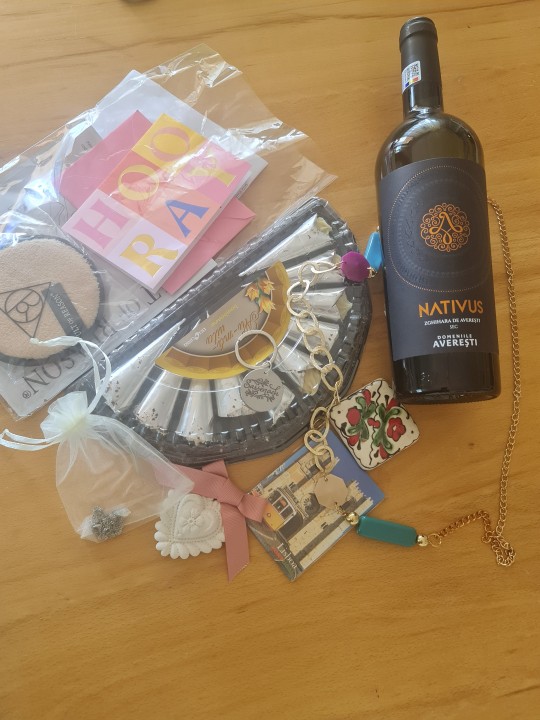
In 2017, I came across this text about fandom and since then it has been an illustration of this crazy and magical universe of fan life, which I call fan experience. Even though I've been going to Outlander Cons since 2015, it was when I met my Spanish friends that I started to not feel alone even when surrounded by people at these events. And at this LandCon, in addition to my dear Spanish friends, I was able to meet other friends from Tumblr. For years we've been following, reblogging, commenting, laughing, protesting and, above all, supporting each other. And suddenly, there's that "Tumblr username" in front of you and you can finally look the person in the eyes and tell them how much you admire them and thank them for walking alongside you in this fandom, which is so toxic in many ways, but where true friendships can create an oasis. Thank you for everything, girls.❤️
"Fandom is focus. Fandom is obsession. Fandom is insatiable consumption. Fandom is sitting for hours in front of a TV screen a movie screen a computer screen with a comic book a novel on your lap. Fandom is eyestrain and carpal tunnel syndrome and not enough exercise and staying up way, way past your bedtime.
Fandom is people you don't tell your mother you're meeting. Fandom is people in the closet, people out and proud, people in costumes, people in T-shirts with slogans only fifty others would understand. Fandom is a loud dinner conversation scaring the waiter and every table nearby.
Fandom is you in Germany and me in the US and him in Australia and her in Japan. Fandom is a sofabed in New York, a roadtrip to Oxnard, a friend behind a face in London. Fandom talks past timezones and accents and backgrounds. Fandom is conversation. Communication. Contact.
Fandom is drama. Fandom is melodrama. Fandom is high school. Fandom is Snacky's law and Godwin's law and Murphy's law. Fandom is smarter than you. Fandom is stupider than you. Fandom is five arguments over and over and over again. Fandom is the first time you've ever had them.
Fandom is female. Fandom is male. Fandom lets female play at being male. Fandom bends gender, straight, gay, prude, promiscuous. Fandom is fantasy. Fandom doesn't care about norms or taboos or boundaries. Fandom cares too much about norms and taboos and boundaries. Fandom is not real life. Fandom is closer than real life. Fandom knows what you're really like in the bedroom. Fandom is how you would never, could never be in the bedroom.
Fandom is shipping, never shipping, het, slash, gen, none of the above, more than the above. Fandom is love for characters you didn't create. Fandom is recreating the characters you didn't create. Fandom is appropriation, subversion, dissention. Fandom is adoration, extrapolation, imitation. Fandom is dissection, criticism, interpretation. Fandom is changing, experimenting, attempting.
Fandom is creating. Fandom is drawing, painting, vidding: nine seasons in four minutes of love. Fandom is words, language, authoring. Fandom is essays, stories, betas, parodies, filks, zines, usenet posts, blog posts, message board posts, emails, chats, petitions, wank, concrit, feedback, recs. Fandom is writing for the first time since you were twelve. Fandom is finally calling yourself a writer.
Fandom is signal and response. Fandom is a stranger moving you to tears, anger, laughter. Fandom is you moving a stranger to speak.
Fandom is distraction. Fandom is endangering your job, your grades, your relationships, your bank account. Fandom gets no work done. Fandom is too much work. Fandom was/is just a phase. Fandom could never be just a phase. Fandom is where you found a friend, a sister, a kindred spirit. Fandom is where you found a talent, a love, a reason.
Fandom is where you found yourself"
83 notes
·
View notes
Text
I see so much RadioStatic backstory of “they were friends but Alastor broke Vox’s heart” but I would like you to consider:
Vox, soon after his death and feeling lost and disconnected, seeking out other sinners with an interest in the only connecting point he has to others, media.
And, in doing so, he goes out of his way to make the acquaintance of the Radio Demon, the only overlord who seems to have the same passion for entertainment that Vox does himself.
And Alastor does not get approached by anyone, because everyone is terrified of him; his only real connection since his own death has been Rosie, and they bonded over cannibalism, not the art of entertainment.
But Vox wants to make his acquaintance, Vox wants to talk shop with him, and Alastor finally has someone with whom he can discuss storytelling and evolutions in broadcasting technology, someone he can stay up with all night who appreciates rye as much as he does and who listens to his infodumping with real rapt attention and who does his own infodumping in a way that Alastor finds compelling.
Alastor tells Vox all about what it was like during the birth and rise of radio and what it was like to run a radio program back during a time when it was the hot new thing.
And Vox teaches Alastor about television, and about writing serialized scripts meant to be seen and heard, and about filming and audio recording and costuming and set design.
And Alastor is subversive and forward-thinking, and he loves television; he loves seeing what beautiful and visual things can be done with the serialized stories he always loved writing for his radio program.
Vox is someone Alastor readily calls his friend.
But Vox is a capitalist, above all else, willing to throw away his artistic integrity and smother his own creativity in his eagerness to chase whatever is new because it is new, and Alastor watches that bright spark that had drawn him to Vox become buried under the weight of corporate greed.
And when Vox asks Alastor to join him, Alastor says no, because the Vox who asked for his partnership was not the same man that Alastor sat up all night with so many years, he was not the same man that Alastor wrote ridiculous scripts with, he was not the same man who approached Alastor without a hint of fear flickering on his screen and introduced himself with a cautious smile and a sincere compliment for his last broadcast.
Alastor says no, because this man is not his Vox; this man, instead, murdered his Vox and is wearing his skin like a grotesque costume.
Alastor says he hates television, because television reminds him of a time he almost permitted himself vulnerability, and can’t admit that it destroyed him.
What if, instead, Vox was the one who broke Alastor’s heart?
#hazbin hotel#hazbin alastor#hazbin vox#radiostatic#hazbin radiostatic#admittedly i am only on board as a doomed ship#but what a beautiful shipwreck it would be
397 notes
·
View notes
Text
Thoughts About the Potential Underlying Hidden Tragedy of Yanqing and Jing Yuan
that isn't just the "Yanqing will have to kill Jing Yuan eventually" red flags.
A relatively longer-ish post so thank you for bearing with me if you choose to do so!
I'd already been thinking about this whole mess of thoughts for a long while now, and so have other people, but the urge to write this came from a comment I saw on a post that mentioned how Yanqing had lost to "Jing Yuan's ghosts" and overall how it contributes to the dynamic of them being mentor/mentee + father/son. While the narrative seems to be leading to "Yanqing having to strike down a Mara-stricken Jing Yuan," there's just enough weird points that stick out to the point some alternative outcomes for Yanqing and Jing Yuan's fates to play out.
And while I anticipate HSR to follow that most expected point, I feel like there's enough there that could lead to a subversion or something more likely than that, an additional twist to the knife alongside the expected point.
Jing Yuan's Flaws as a Mentor and Father-Figure:
While most of us love the family fluff, I'm pretty sure we can all acknowledge the issues in Jing Yuan's approach and decisions in regards to Yanqing. Yeah, this is a fictional space game story where it's likely they aren't going to delve into the consequences of having someone as young as Yanqing be a soldier, there seems to be something there regardless. Like the brushes with death that he has and how we see him have to worry about the Xianzhou's security as a teen due to having a higher position in a military force. This is all set up for more of a coming-of-age type narrative for him, which HSR has done amazingly so far, but there are a lot of chances for this to explore something darker.
Among official media, the one time I could even remember the term "father" being used in relation to Jing Yuan is in Yanqing's official Character Introduction graphic:

Another notable thing that we see here is how we do have moments where Yanqing expresses thoughts and questions about his own origins and birth parents. The fact that even here, he wonders if the general is hiding something from him, sets off some alarm bells in my head. But he then brushes that off because he's always been with the General and Jing Yuan accepts him for who he is (which under the theory that Yanqing originates/is connected to the Abundace adds a whole heavy layer (this will be discussed in a later section)).
Yanqing does something similar in his texts:


As Huaiyan says to Jing Yuan:
"Yanqing can understand your concerns."
Alongside Yanqing generally being a considerate and polite boy, it can possibly be said that his eagerness to share Jing Yuan's burdens not only stems from his own gratitude towards him but possibly also Jing Yuan's distance.
As in, Jing Yuan doesn't really express his feelings so blatantly, and what we can clearly tell from when Yanqing first met "Jing Yuan's ghosts," neither does he speak much about his past too on a personal level. In Jingliu's quest, Yanqing says that Jing Yuan simply told him to forget everything he saw that day.
For Jing Yuan, the loss of the quintet is a grief that feels fresh in his heart, especially with echoes of them running around him. This is in the description for "Animated Short: A Flash":

(Will also talk about this in a different section)
While Yanqing learns about his General's past in a more direct manner (aka the people involved), it's sad how avoidant Jing Yuan is at times. While he's never been a upfront person, especially in the case of solving problems, I wonder if HSR would go as far as to show the negative side of that in terms of raising and teaching Yanqing.
History Repeats Itself (Sometimes It Don't Need A Reason):
+ the Jingliu parallels
Following up on that last image, Jing Yuan, especially in A Flash, has that whole "history repeating itself" thing going on for Jing Yuan. It points to Yanqing having to take down Jing Yuan but it also comes with a lot of its own possibilities and meanings.
It's blatant that Yanqing parallels Jingliu to an unsettling degree. Anyone who personally knows Jingliu and meets Yanqing sees her in him. Jingliu probably sees herself in him as well. Beyond powers and passion for the sword, her Myriad Celestia trailer shows that her principles before getting struck with Mara were the same as his. But it took her losing her dear friends in such a cruel and brutal manner (alongside how long she'd been alive) for all of that to fall out and form the version of her we see today.
And while it seems that Yanqing is deviating from Jingliu's due to the teachings he's learning, especially with Jing Yuan's effort, I feel like there's still a chance for things to go so wrong and mess with that. Yukong's line about him strikes me as concerning:
"A sword will vibrate and beg to be unsheathed if it is unused for too long... Once unsheathed, it will either paint the battlefield in blood, or break itself in the process..."
Even though I don't think HSR will go down a route of tragedy with Yanqing, like say, he gets Mara struck somehow or killed because that's not how Hoyo's writing has fully gone for playable characters (Misha and Gallagher aside in terms of death). Even in the most despairing parts for Hoyo's games, they're usually outlined and tinged with hope in one way or another. It's just that with what's been presented, there's got to be more here than meets the eye.
Yanqing's Origins - The Breaking Point:
From what we've been given, I think the number one thing that would have the potential of shaking Yanqing's entire sense of his life and the reality he lives in is learning where he comes from. Where he actually comes from has been a strange mystery since the beginning, how Jing Yuan getting him being recorded in the military annals of all places.
As shown from the screenshots of Yanqing's texts, he doesn't know and tries to brush it off because he's happy with Jing Yuan now. The choice to have this aspect here leaves a lot to ruminate on. What is Jing Yuan hiding? And if he really is witholding information, does he ever intend to tell Yanqing? If he doesn't and Yanqing finds out, how will it play out? And even if he does mean to tell him, depending on the severity, how will Yanqing take it?
It's why the theory that Yanqing is connected to the Abundance, possibly even coming from it directly, is as harrowing as it is.
With his arc in mind, will his development be enough to sustain him when he does find out the truth? If he finds out sooner than he should, will he be able to rise above it? And what of Jing Yuan? If confronted with a situation that's outside of his control again, what will he do and how will he react?
The potential in that scenario is so fascinating to me, because we can all anticipate the absolute gut punch that Yanqing killing his master would be. It fits Hoyo's writing style of something so sad but having a hopeful end for the future type beat. But the idea of that being twisted, that expectation being flipped on its head, could be so agonizing. It's not a narrative we see too often explored, at least in my experience, so maybe that's why I'm brainrotting over it so much lol.
#honkai star rail#hsr yanqing#jing yuan#hsr theory#character analysis#yanqing losing jing yuan is one thing but jing yuan losing yanqing is another lol#i really don't think hsr would do it like that but it'd be wild if they do#at most they're gonna do something that really fundamentally changes them as people haha#new form yanqing perhaps? haha ha#mara struck or abundance form yanqing would be devastating lolol#struggling jpg thinks
176 notes
·
View notes
Text
In "KAOS" nothing is anything, and everything is wrong
Two disclaimers: I am no stranger to modern art, and I have no issue with queerness in shows, or in my own mythology (I'm Greek). I am also aware that KAOS is a comedy. It's in the gutter of British comedy, but still part of the genre. At least I laughed every time they said "Oh God!". I don't believe this is the same person who wrote the great and amusing "End of the F**king World"! The premise of "The gods in our modern world" appeals to me a lot, so that wasn't my problem either. My general issue with KAOS is its horrible delivery, bad writing, and piss-poor Greek representation.
This is gonna be long and full of stupid gifs, so sit comfortably, grab a coffee or some popcorn and... pame!

The "ILoveGreekMythology" Kid
Art without context is just a pretty thing to look at. Most of the time, this context can be found within the art piece itself, as the artist has taken care to weave it in. KAOS refuses to connect itself to any context besides the names and a few vague powers. It aims to exist outside of those "boring old stories of the Greek myth" and be entirely "fresh and modern". Something impossible when the entire show and the meanings are based on ancient recorded material. In other words, KAOS is so meta that it ends up being nothing. KAOS cannot stand on its own because you need more than the viewers being familiar with the Greek myth basics to pull such a show off.
KAOS tells us "See? I know all the names of the gods, and what they did, and I know all the locations, so I am qualified to tackle this". More or less like any Western kid who takes all their knowledge from PJO and Marvel and proceeds to unironically hate ancient deities and make a girlboss out of Medusa.
Here's a Greek word for you guys, ημιμάθεια, meaning "half-knowledge". Α Greek saying very well declares "Half-knowledge is worse than no knowledge". The confidence of thinking you know enough often leads you to grave mistakes whereas the humility of not knowing prevents you from touching shit that you shouldn't. When you have no idea what the original myth is trying to say and spit on its meaning, knowing a few names and locations is just smoke and mirrors. I don't believe the audience fell for that.

And don't get me started on the "subversions". A good subversion is intriguing and thought-provoking. In KAOS, every twist was hollow - Greek myth related or otherwise.
"What if Euridice doesn't love Orpheus?" I don't know, babe. What if??? What was the point of that? What did you show us? That women's stories are dominated by men and men don't listen to women, perhaps? And you chose to twist... the love story of Orpheus and Euridice to show this?? One of the best and most tragic love stories Greek mythology has to offer?? You just mocked the myth, you didn't make anything profound out of it.

The Greek Stuff (Nothing salvageable)
I was surprised to see they had a Consulting Producer (Georgia Christou) and an Assistant Script Editor (Isabella Yianni) who happen to be Greek. And I stress that because those people probably weren't hired or utilized for being Greek. We are not sure they were involved in cultural decisions because we have no evidence and because shows with no Greek elements can have more Greeks than that on their staff.
Okay, perhaps they took 5 seconds to ask Isabella about a greeting - which they proceeded to say in a wrong intonation 🙄🤌It's where Poseidon says "ya sás" in the Fates, by the way. How he said it sounds more like "for you (pl.)" than "health to you (pl.)".
Surprise! The only Greek actor present (Peter Polycarpou) has less than 5 minutes of screen time and plays the caricature of an immigrant with a thick (and inaccurate Greek) accent. He has a canteen, selling falafel which is not Greek, and Dionysus buys from him an unidentified tortilla wrap (which... is also not Greek, if you haven't caught up).
For the show they brought in actors of Maori, Nigerian and Sierra Leonean, Pakistani, Black American, Latvian-Jewish, Iranian, Egyptian, Indo-Fijian and Malay descent and you tell me it was impossible for them to seek and find an English-speaking, skilled actor of Greek descent in a show regarding Greek heritage. Sometimes I wonder, do y'all hate us so much?

They considered Greeks only to give us a simple (and wrong) greeting and a stereotype. Crumbs, we are supposed to be happy with. By the way, there are over 70.000 Greek immigrants just in the UK, usually in the urban centers, many of them students or fairly young employees in the corporate workforce. Not the largest minority but not hard to spot either.
Another plague of Anglophone shows: Almost everyone's Greek name is shortened. Yes, we know their full names but we are told that we will use the short ones. Greeks and their "long and difficult" names am I right fellas? Because saying "Ariadne" apparently requires 5 years of Greek language training, and no English word ever has more than two syllables.
Coincidentally, short names are cool in Anglophone imaginary universes and the "long" names are not. it's so strange Anglophones never make universes where it's cool for Greek names to be spoken in full hmmm... They don't even want to practice saying a whole Greek name for just 2 minutes in preparation for a show full of Greek names. And don't give me that "Greek is hard" shit when we only talk about a few syllables. If Greek kids can learn English since first grade and people here can sing English songs and spell English names, you have no excuse.
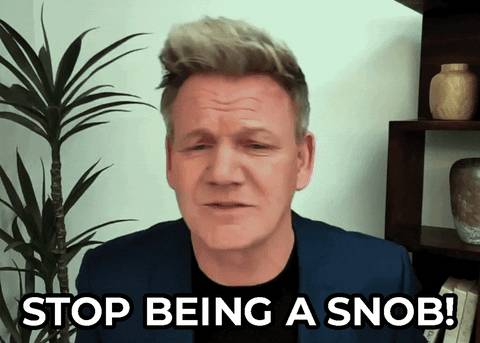
They also said the name "Fotis" means light, which is close enough but... ugh.. It's like saying Sebastian means "respect". I am not sure if they asked anyone or what their research was here. If I had the writers in front of me, I'd be like:

(This character from an all-time favorite Greek show is called Fotis)
They also made the flag of "Krete" an alteration of the Greek flag and the local Cretan flag. Which is the stupidest move, because they had to remove the religious symbol of the cross to make the flag fit the universe. These are flags created based on 1) Christianity 2) the Greek Revolution of 1821.
National Greek flag to the left, local Cretan flag to the right:
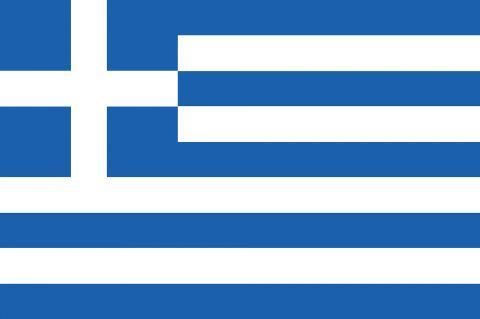

Flag of the KAOS' "Krete":
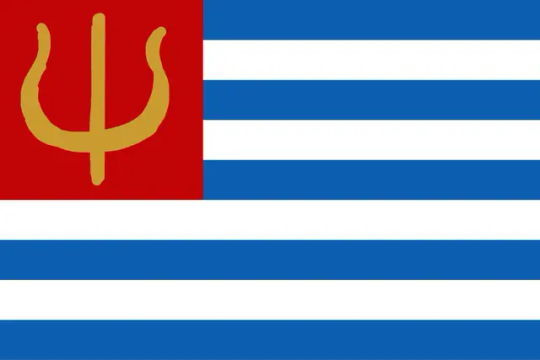
The only time they seriously took into account anything Greek, was the time when they decided to remove the religious symbol of our ethnoreligion AND (from what I could observe) keep the nine stripes?? The nine stripes of our national flag represent the syllables in "Freedom or Death". The colors are from the white foustanela of the mainland attire and the dark blue vraka of the island attire, the clothing of the Revolution fighters. (That's more of a meta explanation but the characteristics of the flag were decided during and nearly after the Revolution.)
I think I don't have to explain it more but it's not a homage to put the nine stripes in an ancient era where they have no meaning, and to replace a cross??? Let's... not replace religious symbols on national flags, okay? Thank you.

Another cultural element they changed was making everyone have a dedicated coin to pay Charon. Orpheus has Euridice's coin, "her coin", and he's meant to put it on her before she got buried. In Greek culture, any coin would do. Sorry that our culture restricts your script, dear writers. I guess you had to bend this too, in order to create a cohesive plot with a semblance of a twist.
Finally, the many "Kerberus" dogs were cute and I can understand the creative decision behind that. However, in a show full of inaccuracies, this made me roll my eyes a little. I think the showrunners know that Kerveros is not a breed of dog, and there can only be one of him because he doesn't have any other "Kerveros" to breed with. On the other hand, as demonstrated from art/writing on the internet, quite a lot of Westerners are not exactly aware of how our monsters work, so forgive my uncertainty 😅
Nothing is Anything
Every element KAOS played with ended up meaningless. In the words of a Lifo article:
“Zeus is a paranoid authoritarian dictator in mid-life crisis who fears losing his power and murders his aides to vent. Hera is a promiscuous goddess who repeatedly betrays Zeus and has mutilated mute priestesses for protection. Dionysos is a spoiled and immature zoomer who, apart from pranks, indulges in orgies with all genders. Poseidon a sadistic god of the sea, who tortures the crew on his ship for fun. Prometheus is gay and killed his lover so he could overthrow Zeus. Orpheus is a famous pop singer and Eurydice does not love him. Theseus is black and gay. The Erinyes are tough-as-nails mechs that look like they stepped out of ‘Sons of Anarchy’. The Fates resemble a three-member jury in a talent show. The Trojans are a terrorist group that acts against the gods. Crete is more reminiscent of California than the Mediterranean.”

The "River Styx" is a sea, the "River Lethe" is a lake, the gods are nothing more than spoiled humans, the Moirai are drag queens, the Cave is a club where you have to take a quiz to enter the underworld, and generally everything is modern, flat, mundane and anticlimactic. The producers aimed to achieve a work so meta that a "river" is now a concept, a metaphor, whatever you have in your heart. And those who want to see a river when we speak of a river are probably uncultured swines and don't understand postmodernism. Never mind that rivers are rivers in Greek mythology for a reason. That's not culturally interesting enough to explore compared to the new, cool approach of not assigning meaning to anything. That totally shows love for the original rich and meaningful material...
And the reason behind all this subversion? Probably the shock factor. They brought the characters to a point where they said "We have to save the world from Zeus" - Zeus! The father of gods, heroes and humans! - just because they could. It gives off a certain type of smugness that I personally don't like. I mean, I would like the smugness and cheekiness of KAOS if it wasn't a vapid and practically meaningless show. As nothing symbolizes anything anymore, we are just led from hollow plot point to hollow plot point.
If you cut it out of any cultural influence and see it as a story then it's... okay, I guess. But when you consider that it's meant to derive from certain material and it fails spectacularly, it's not a good story. It forgets its bases and doesn't play with the ancient elements at all. Disney's Hercules did it better, FFS!
Bad Writing (pt.1)
KAOS is not without recognizable themes but their demonstration is so juvenile and heavy-handed that it fails to influence a viewer of average intelligence. For instance, "Riddy" says to her religious mother "You dedicated your whole life to Hera, what about me?" Okay, KAOS, we get it. At the same time, this theme nulls itself because it turns out that Ridy's mother was right to do what she did, as she had a greater goal in mind. (And this, kiddos, is called Bad Writing, because your themes and scenes contradict each other)

The biggest theme I spotted was a criticism of religion and religious people who say "Do as I say, not as I do" and create exceptions for themselves. Only, it's not a criticism of anything real, in this case. It's a fact that some people in the clergy tend to preach peace and love and then they do harm, but we don't know, for example, that The Goddess of Marriage is a cheater and yet she pressures everyone into strict marriages. By focusing their wrath on divine beings who are not known for their hypocrisy, the creators missed the mark.
I can give KAOS props for how it handled Trojans to reflect real issues regarding how immigrants and war refugees are mistreated and blamed. I'd argue it was the only (nearly) well-done theme in the whole show because it had the least on-the-nose delivery and some genuine/serious scenes. But that's it.
More Bad Writing!
Jeff Goldblum's Zeus is shit. He'd crap his pants in an argument with a stern Greek dad/uncle his age. Is this character supposed to be intimidating? (Laughs in Mediterranean) That's not to say that Goldblum is not a good actor, but this role wasn't for him. The same can be said for the other actors, too. They are competent but they only give off the air of "The Greek gods if they lived in London, from the minds of people who think beards and body hair are an affliction". In addition to being misplaced, the actors cannot show their talent when following a script that resembles a children's book.
Why does THE GOD Dionysus have the maturity of a 15-year-old? I repeat, The God Dionysus. He's a freaking deity, and a very old one at that. He is not a teenager neither in appearance nor in experience. In our culture, he is mystical, mighty, wise. Why did they downgrade him so? Just for the plot? This is not Dionysus just because you named him so.

The dialogue rarely takes itself seriously to the point it has you wondering at times "Do people talk and behave like that?". In a comedy where everything is meant to be already extreme and parodied. Even in comedies, something must occasionally be serious so there is a healthy fluctuation in tone and the funny moments can hit you. In KAOS very few scenes treated their impactful dialogue as it should be treated.
The queerness and diversity (good elements, in general) were worse off for being in KAOS. Like, I want these elements to be there. I'm just sad about the whole situation. It's not enough that the show is shit, now you also give an additional reason for conservatives to shit on diverse and queer characters because they are part of a stupid narrative.
I'm the type of person who doesn't mind the queerness of Astyanax and Theseus being lovers in the context of this specific show but they're still the oddest pairing to me because they're from the most irrelevant myths and eras. Also, Astyanax in my mind is a baby who died tragically, for little reason if we are honest, so to bring him back and make him a love interest is... ekh.
In addition, isn't Astyanax supposed to be crippled after a fall from the city walls when he was a baby? Sorry to change subjects but the show is so convoluted and with so many issues that it's extremely difficult to stay on track with what's wrong.

To the person who thought this show was a good idea:

Whatever. Bye. I'm fucking done.

#kaos netflix critical#anti kaos netflix#greek mythology#greek gods#retellings#kaos dionysus#kaos zeus#kaos hera#critique#review#greece#xenoi doing bs#movies
175 notes
·
View notes
Text
I cannot for the life of me find the original post (tumblr is a hellsite) but this was sent in an atla gc:
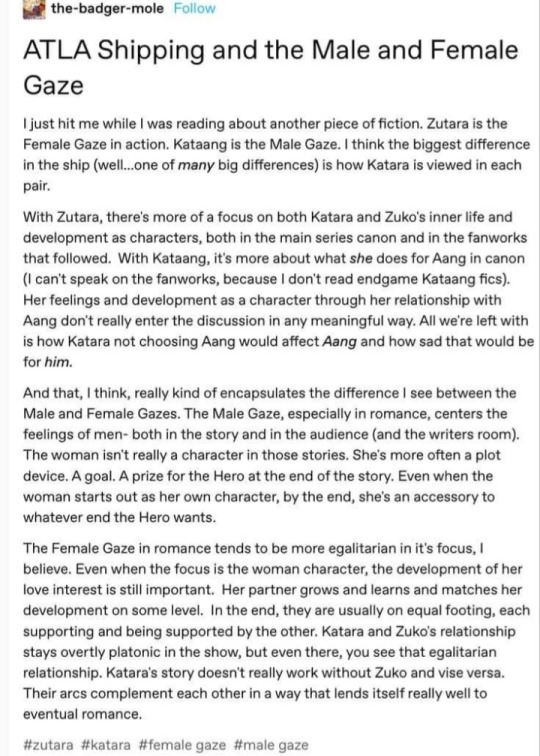
@the-badger-mole
and tbh i always kinda felt like kataang was weird exactly because of that one-sidedness??? like there's one episode of katara maybe sort-of seeing aang as a love interest (when the fortune teller tells her she'll marry a powerful bender), but then the rest of the show is her being passive in the relationship or actively pushing aang away (like their second kiss). and then at the end she just randomly decided "okay i like you i guess."
whereas aang got a bunch of pining moments and you actually believed he was in love with katara.
and most of their relationship was about how she helped aang - he did contribute to her character development over the course of the series especially as a bender of course but it didn't feel as emotionally/spiritually deep as katara's literal one episode sidequest with zuko.
but then someone else wrote "I would argue the opposite? Kataang is where Katara choose the peaceful nomad which subverts the trope presented where zutara is where she chooses the strong protector/combatant. Aang as a character is a subversion of the typical hero while zutara is like,,, coloniser romance idk"
and honestly... i kinda get that. aang was problematic in a lot of ways, but he was definitely a subversive protagonist, and i can see the power of allowing the woman to choose the pacifist vegetarian over the extremely obviously hot jock badboy. this is an incredible oversimplification of their characters of course, but the point stands.
Basically, Kataang is the ship we all logically want - the sweet, friendship-based, seemingly subversive one. But Zutara is the one that actually makes sense in the story, with these characters, not their tropes. Aang is subversive, but he and Katara are also kind of terrible for each other - he isn't mature or selfless enough for Katara, who needs someone to force her to take care of herself because she's always the one taking care of everyone else (wonder what that's like). That's why she and Zuko are so perfect, because he not only takes care of her, he makes HER prioritize herself. Aang... does not. He's pretty selfish, which yes is partially due to his immaturity (I personally don't count Korra as canon because it treated ALL the og characters terribly so I'm speaking purely from his 12 yo self), but it's also just a basic incompatibility thing. And Katara is actually equally bad for Aang - she enables him waaay too much, and he needs someone who doesn't. Who forces him to stand up on his own two feet and take responsibility. She's too much of a mother, and her relationship with Aang is too mother/older sister-ish.
With Zuko, on the other hand? Katara started out HATING him, forcing him to prove himself to her instead of handing him everything she had like she tended to do with Aang and Sokka. He had to earn her care, and as a result he appreciates it way more and demands way less of it. He's a far less selfish character generally for the same reasons, and is much more mature/has a better understanding of life and gray areas. Southern Raiders is a great example of this - he's down for whatever Katara decides because he understands that there's no one right answer, unlike Aang who simply preaches forgiveness. I'm not necessarily attacking Aang about that either - I do believe that grudges eat away at a person, and taking a life does haunt you, so forgiveness isn't necessarily bad advice. But it's not what Katara needed. Aang is great as a friend, but I don't think he's what Katara needs from a romantic partner. Zuko just... is.
#zutara#rant post#anti kataang#kind of??#i don't feel like it's super anti but it still is so i don't want beef#atla#avatar the last airbender#katara#aang#avatar aang#zuko#prince zuko
315 notes
·
View notes
Note
COKO. Dude. This latest update- Holy MONKEY FEATHERS.
Let’s begin cause there’s a LOT TO COVER HEHEHEH~
Firstly
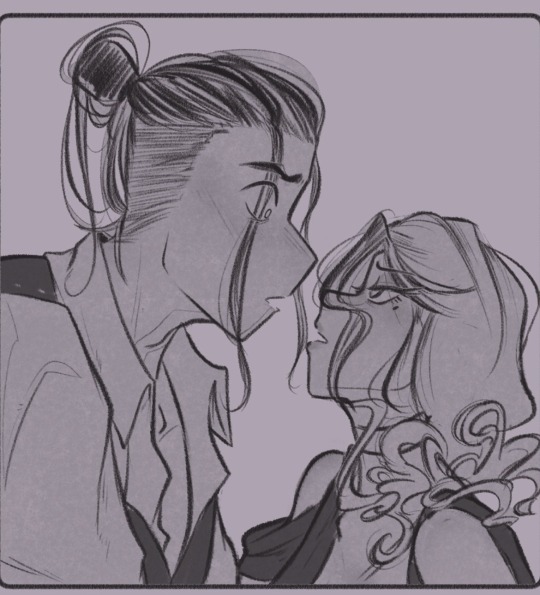
LOOK AT THIS MAN’S EXPRESSION. Just- FRIGGIN LOOK AT IT. He’s blushing, he’s tense, he’s confused and flattered and weirded out, and happy- This man don’t know what emotions are and he just got hit by a truck full of them.
And AGAIN- KENDRA IS COMPLETELY INEBRIATED- She will most likely not even REMEMBER THIS MOMENT- Will Donnie tell her? Will this be a hilarious story that causes an argument later down the lines in their marriage?
WHO KNOWS. 🤷♀️ And it DOESN’T END THERE-
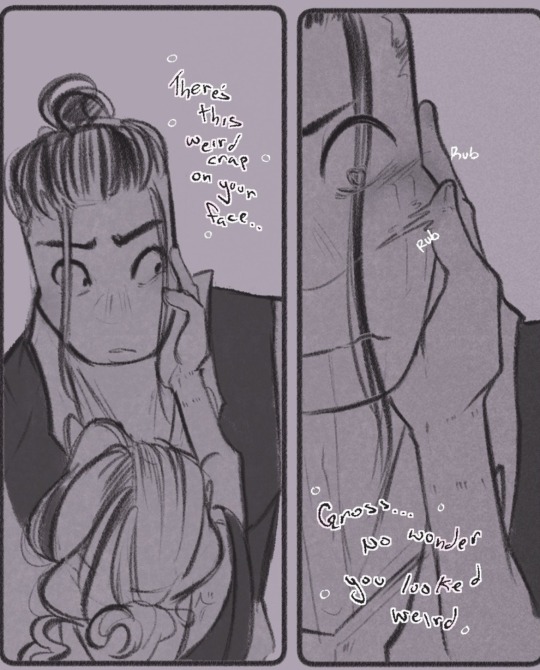
Not ONLY is Donnie flying through the five stages of grief like a boss level mini game- but Kendra, even in her drunken state, noticed that Donnie had that dumb makeup on him to cover up his markings for the party. And she just- gently- caresses his cheek to wipe it off.
Yeah, Donnie’s gonna die from either too much happiness or being way too flustered. Either way-
Awwwwwwwwww 💜
NEXT.
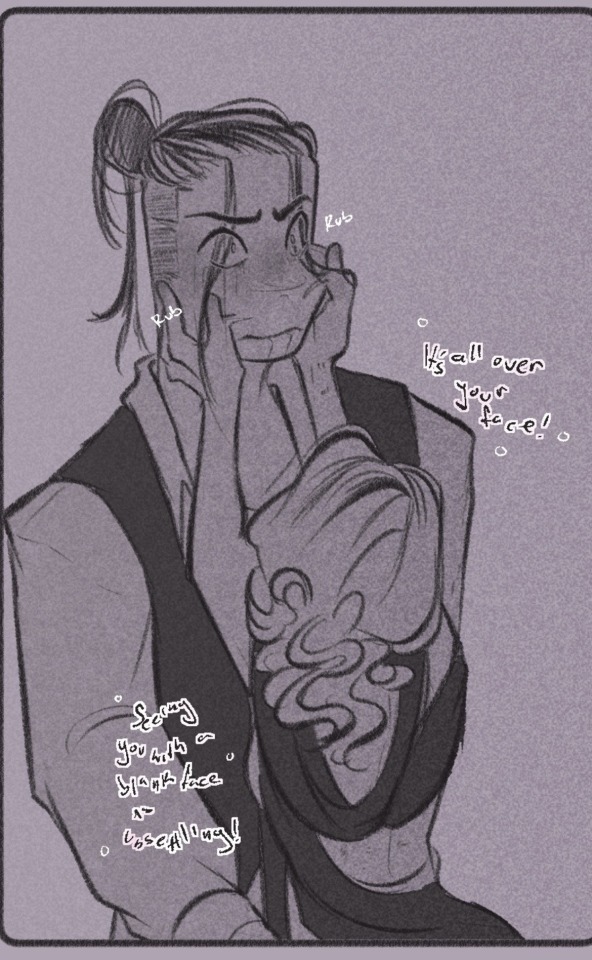
Despite being completely paralyzed in fear love, Donnie’s gaze quickly makes its way to where Big Mama and Frida are. And what does he see that gives him this horrified of an expression?
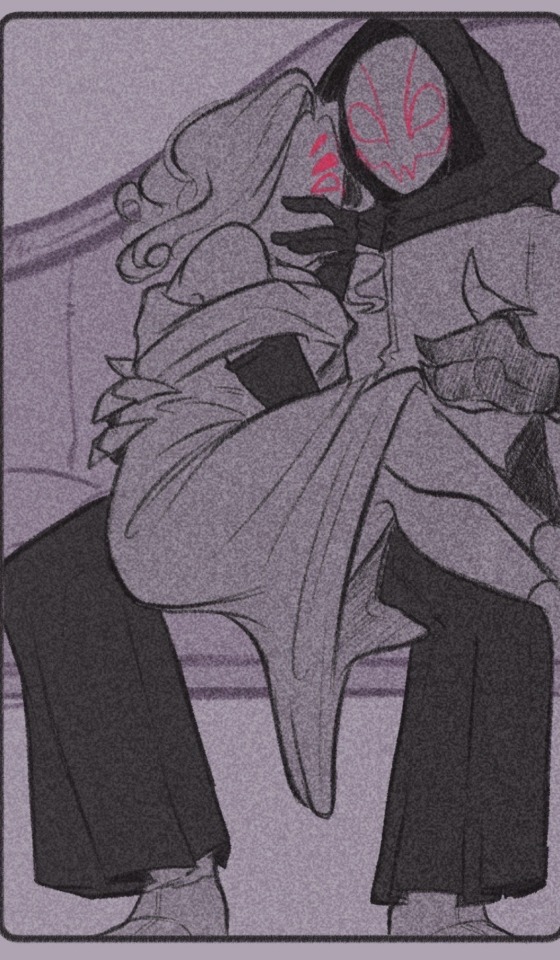
OH- SHEEEELLLLLL NO.
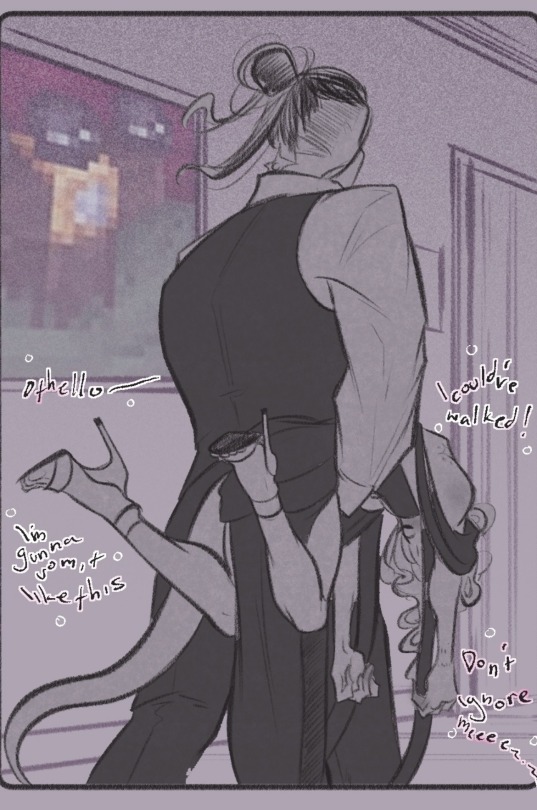
So, like the reasonable turtle mutant Donnie is, he gingerly picks up Kendra and leaves the party.
Also can we just study this anatomy for a second cause GUYS- as an artist myself this kind of posing and proportions is NOT EASY TO DO. So-
👏👏👏👏👏👏👏👏👏👏👏👏👏👏👏
WELL DONE, COKO!!!!!
Ok, so after they make their way back to their room, Donnie plops Kendra into bed. We’ve seen this before- he’s never gentle, literally throwing her and it’s absolutely hilariou-
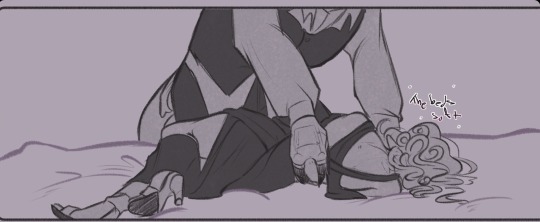
… Expectation SUBVERSION- the SWEETEST I’ve ever seen. 🥹 Donnie’s being so gentle with her what the HECK DJFUJWVXMISUDHWBSUW I adore these two- they love each other so much- caring for each other despite their qualms and history- AAAAAA ITS SO GOOOOOOD!!!
And now that Kendra is safe and away from Big Mamas prying eyes, Donnie has time to ABSOLUTELY FREAK OUT.
THIS DUDE went from feeling nothing to feeling EVERYTHING. And we get to watch and die laughing at his expense~ *WHEEEEEEZE*
This dude is totally broken HAAAA
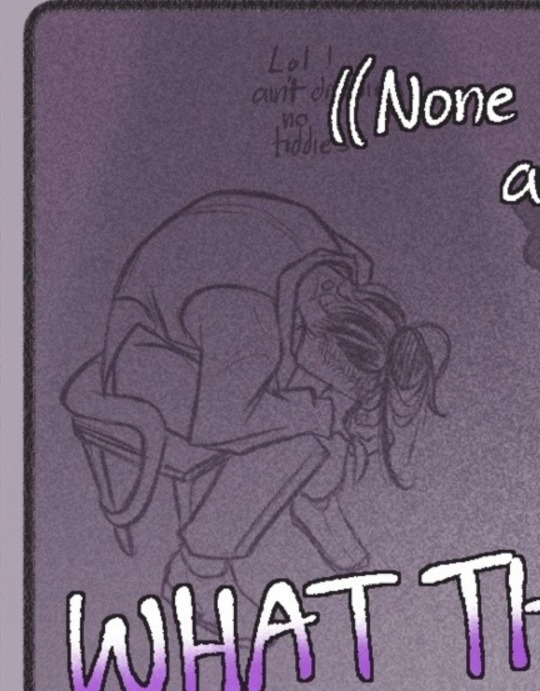
Alright- with emotions and feelings and imagination WAY TOO HIGH, Donnie tries to distract himself.
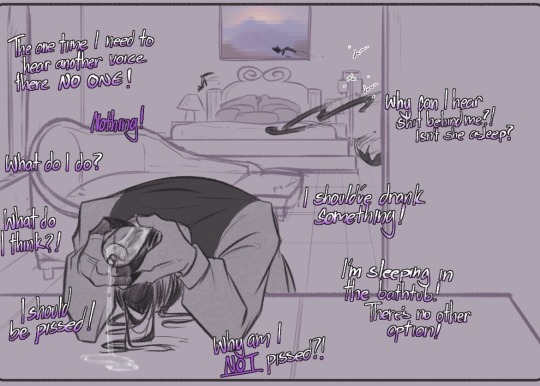
The comedy in this chapter is just top tier~ I was at work when I read it the first time, and I broke out laughing and wheezing. (So grateful I work alone HA)
And just when Donnie thinks he’s in the clear-
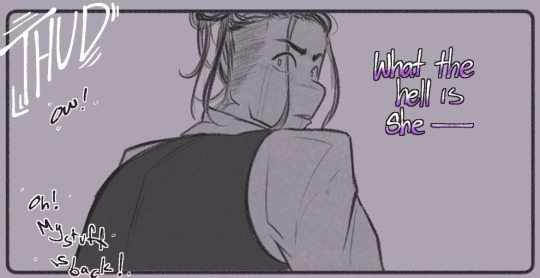
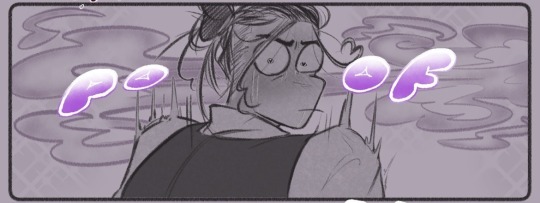
*Chaos Gremlin chortling sounds* Coko, you absolute GENIUS- HAHAHAHA- I love that you simply allow the audience to imagine what Donnie saw- No one needs to outright say it, we all just know. And it’s utterly hilarious.
Donnie’s never gonna recover from that brain poof- You can just see all of his brain cells and bad boy image DISSOLVE in an instant at such a sight. 🤣 HIS HAIR EVEN CURLED UP- HIS EYES ARE BUGGING OUT- HAHAHA THIS DUDE’S brain went from dead to running a marathon in a MILLISECOND.
Alright, I think this has gotten long enough, so I’ll stop there. 😅 Amazing work, Coko!!! I am VERY excited to see what happens next!
~ Melissa
AUUUGGHHH ill never tire of these asks pointing out the little things cause yall almost always get like 80% of the lil things i slap in updates
THANKS FOR SEEING MY EFFORT IN THAT PANEL! THAT ANATOMY WAS A BITCH.
While sketching the update I may have been watching some goofy shows and movies so influence from those was high. Figuring out ways to show without showing what was going on took longer than expected but HEY! YALL GOT THE IDEA SO SWAG.
If my shoulder stops hurting I might have the next update by morning. Im gettin a lil too excited for what’s next. Already picked an emoji for the next chapter thing
70 notes
·
View notes
Text
Happy New Year! Anyone else make it to midnight? I sure did! *me at midnight, fast asleep, dreaming of the desert*
Scar, singing: He's making a list, checking it twice, gonna find out who's on thin fucking ice Grian, also singing: Santa Claus is calling you out!
Grian: It's called cauliflower, not ghost broccoli. Scar, eyes wide: I know what I saw.
During a game of Hangman Grian: Nope, there’s no Q. You lose. Scar: Are you kidding me?! You can still add something! Grian: I already added a belt, four earrings and an extra arm! YOU LOSE!
Scar: How did you break your leg? Grian: Do you see those porch stairs? Scar: Yes. Grian: I didn't.
Scar: Which is correct, seven and five IS thirteen, or seven and five ARE thirteen? Grian: Neither. Grian: Because it's twelve.
Scar: What does a winner do when life gives them lemons? Grian: Um, make lemonade? Scar: No, they squeeze them right back into life’s eyes!
Grian: When you've been on the internet for as long as I have, you develop thick skin. Scar: Navy blue isn't your color. Grian: Navy blue brings out my eyes you prick! Chases after Scar
Grian: If you spell skeletons backwards, it still spells skeletons. Scar, deadpan: Wow, I can't wait for Halloween to see some snoteleks.
Scar: So what’s for dinner? Grian: I can’t tell you, it’s a soup-prise! Scar: … Scar: Is it soup? Grian: I soup-pose it could be! winks Scar: Please, enough with the soup puns! Grian: Wow, you’re soup-per mean. Scar: STOP! one hour later Scar: It’s fucking tacos?!?!?!
Scar: You’re overthinking this. Grian: You don’t know the appropriate level of thinking, Scar. What if I’m underthinking?
Grian: I regret nothing!!! Scar: I regret everything!!!
Grian: Am I right, Scar? Scar: I’m almost certain you’re not, but to be fair, I wasn’t listening.
Scar: Grian, where’s your report card? Grian: My friends stole it from me at school, so now I don’t have it anymore. Scar: Do you think I’m stupid enough to believe that lie? Grian: What lie? Scar: That you have friends.
Grian: Scar, are you drinking… drinking hydrogen peroxide?! Scar: It says H2O2! That means it’s the sequel to water!
While planning to break in somewhere Grian: Hey, let's do "Get Help!" Scar: What? Grian: "Get Help." Scar: No. Grian: C'mon, you love it! Scar: I hate it. Grian: It's great! It works every time! Scar: It's humiliating. Grian: Do you have a better plan? Scar: No. Grian: We're doing it! Scar: We are not doing "Get Help!" A Minute Later Grian, carrying Scar: Get help! Please! They're dying! Help Them! throws Scar at guards, knocking them out Grian: Ahh, classic! Scar: gets up I still hate it. It's humiliating. Grian, laughing: Not for me, it's not.
Grian, staring lovingly at Scar: I would die for you. Scar, doing their own thing: Then perish.
Scar, shakily: Please, just tell me what the book is about. The plot, please. Grian, reading an annotation on the cover of a book, unfazed: A subversive masterpiece. A deep and touching story. New York Times Bestseller. Grian, now looking directly at Scar: Go fuck yourself.
Grian: I'm going the fight the next person who insults Scar. Scar: I hate myself. Grian: Alright, square up.
Scar: I’m so excited! Grian: We’re gonna have the best costumes, get the most candy… Scar: And have the biggest stomach aches ever! Grian: Yeah!
68 notes
·
View notes
Text

Growing up, one of the things that was a regular ritual for me was to read the micky mouse magazine, and to play with whatever little knickknack they came with that week until it was thoroughly destroyed.
I'd often skip to the pages with the jokes, right around the middle of the magazine- I was terrible at telling jokes. My own attempts at jokes would often be completely abstract- I did understand, on some level, that part of humor was a subversion of expectation. I remember, in particular, thinking up a joke I thought was totally hilarious. It went something like... "Imagine if you were in a haunted mansion...* and then you fell through a trapdoor! but then... it started raining McDonalds** coupons on you!" It absolutely crushed me that my older sister didn't think this was even a little bit funny. She did laugh, but it was at how funny I thought it was.
My jokes did get better, with time, and careful study. When it came to the comics themselves, I had little interest in the ones that featured Mickey, or... most of the cast, really. Donald was the one who really caught my eye. In almost every story, he'd end up being the one who catches the short end of the (slap)stick, with his misery being the thing that is funny. That's not what I read those stories for, though.
Every now and then, one of the comics would have Donald being triumphant, cool, and competent- especially when he'd don his secondary identity as- huh. Just discovered that the english name for that identity is "The Duck Avenger." What a downgrade. Over here, his name was Phantomias, which I hope we can all agree is objectively cooler.
My shelf must've had... hundreds, if not thousands of those slim magazines at some point... precariously bending the wood they were placed on near the top, where I could reach them from my bunk bed, a steadily growing repository to pick from. It reminds me of how I now listen to podcasts or comfortably familiar youtube videos to fall asleep- (not that I didn't usually finish settling in for night with one audiobook or another. Der Liebe Herr Teufel my beloved...) I do realize that this might seem like pointless rambling, and like the image up there was placed by mistake- but, if I've learned anything about humor and people in the time since my childhood, it's that everyone loves an underduck story.***
#*presumably the scariest situation i could imagine#**presumably the most desirable thing I could imagine#***sorry .
40 notes
·
View notes
Text
june 1: incantation | @wolfstarmicrofic | word count: 546
Remus speaks carelessly. Mouth framing words like each sound is comfortably familiar – not rehearsed but known, something in his bones and blood and given to him by his ancestors. Broad vowels, silent t’s.
Sirius watches his lips move, the scar bisecting them stretch. Hangs on every dropped consonant like it’s a missed step in the dark. Something in him rejoices at the way Remus disregards elision: a flagrant defiance to Sirius’ childhood elocution lessons.
The joy of watching Remus speak is more than subversion from his upbringing – the moments when Sirius can do it like this (undisturbed and unnoticed)? They rebuild something in him he thought irreparably broken. He wants to fall asleep to it, make a cassette and listen to it on repeat, pretend he’s struggling with the material just to have Remus read to him.
There is something else, too. When he’s Padfoot and wants to chase a rabbit, a part of him feral and untamed – this want he can’t name occupies the same space. Something like this: to eat, to devour, to sink his teeth into flesh. Unnervingly, he thinks, he wants to hurt Remus.
“Cùram-slàinte,” Remus mumbles, “loiceadh.”
The part of Sirius that wants to bite him whines.
To hear him speak in English is a comfort. When he throws Latin-based spells it’s a thrill.
Listening as he builds incantations in Gaelic is the same as watching a storm approach with nowhere to hide. Sirius will stand in a clearing, wait for it to drench him, welcome each heavy raindrop. Thank it, afterward, if it deems him worthy to strike.
“Pads, do you have spare ink? I’ve run out.”
“Anything for you Moony, my love,” he jokes, endearment making Remus roll his eyes at him.
The library is quiet at this time of the evening. The other two of their four are playing Quidditch and Gobstones, respectively, as they always do on Fridays. Sirius keeps the days open, ostensibly so he can study (NEWTs are fast approaching, he should be). He brings his books along but doesn’t keep up with the pretends of actually opening them.
“You know.” Remus looks up from the borrowed ink pot, “you won’t get any studying done through osmosis.”
“Could do.”
Remus pretends to consider this. “Even if, won’t do you any good to learn this.”
He’s right, of course, as their Moony so often is. The dissertation he’s working on has nothing to do with Sirius’ work – Gaelic in the creation of new offensive spells is significantly different than his Exploring antimony and its reference as Grey Wolf in Ancient Runes. He doesn’t want to tell Remus he’s already finished his one (and got a tattoo to match) because then his excuse to hang out in the library would become even flimsier.
(Something he should consider: why the excuse and why the need to be there in the first place. Why watch Remus with such closeness, so differently than he does Peter, or James? But approaching these thoughts makes that feral part of him whine me a wounded dog, so he stays clear and indulges himself.)
“At least take your books out, you big mangy dog,” Remus laughs (sunlight falling onto old moss-covered stone) and reaches out to swipe a hair away from Sirius’ eyes.
NEXT PART
NOTES:
this is Part 1 of a 30 part series of standalone shorts which together make a larger story “The 30 ways you found me. Let me know your thoughts!
in the UK at the end of education equivalent to Hogwarts you can opt to do an extended project - essentially a semi large research paper on your chosen topic. I like to think it’s the same at Hogwarts, and that’s what they are working on here.
Oblivious Sirius is one of my favourites
#wolfstar#sirius black#marauders#remus lupin#dead gay wizards#microfiction#remus x sirius#remus loves sirius#fanfic
168 notes
·
View notes